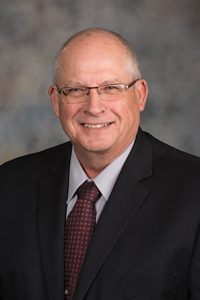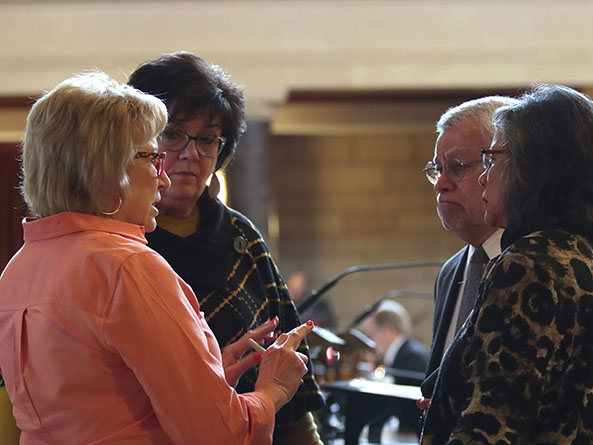Tax cut package advances after successful cloture motion
Lawmakers gave first-round approval March 30 to a proposal that would cut individual and corporate income tax rates, speed up the phaseout of state taxation of Social Security income and provide credits intended to offset the amount of property taxes paid to community colleges.

Supporters of the package made two unsuccessful attempts last week to advance the proposal.
LB873, as introduced by Henderson Sen. Curt Friesen, would have eliminated community colleges’ general fund levy authority. A Revenue Committee amendment, adopted 44-0, replaced the bill with several other tax-related measures heard by the committee this session.
The provisions of LB939, introduced by Sen. Lou Ann Linehan of Elkhorn, would cut Nebraska’s top individual income tax rate in several steps from the current 6.84 percent to 5.84 percent by tax year 2027.
Linehan’s proposal also would continue the phased-in reduction of the state’s top corporate income tax rate, which applies to income in excess of $100,000, approved by the Legislature last year.
The committee amendment would cut the rate from the current 7.5 percent to 5.84 percent by 2027.
Also included are the provisions of LB723, introduced by Albion Sen. Tom Briese.
The proposal is intended to ensure that a refundable state income tax credit does not fall below its current amount of $548 million. The credit, created in 2020 under the Nebraska Property Tax Incentive Act, is based on property taxes paid to schools.
Under the amendment, the credit amount would increase to $560.7 million for tax year 2023 and then increase by an allowable growth percentage of up to 5 percent beginning in tax year 2024.
The amendment also would create a refundable tax credit under the Nebraska Property Tax Incentive Act based on the amount of property taxes paid to a community college.
The total amount of credits this year would be $50 million. It then would increase annually, reaching $195 million during taxable years that begin during calendar year 2026. After that, the total would increase by the allowable growth percentage.
Finally, the amendment included the provisions of LB825, introduced by Sen. Brett Lindstrom of Omaha. His proposal would exempt Social Security income from state income taxation by tax year 2025.
Lindstrom said the proposal would benefit Nebraska retirees who live on a fixed income and are hard hit by inflation.
Linehan, the committee’s chairperson, supported the amendment. She said Nebraska is one of relatively few states that taxes Social Security income and has high income and property taxes relative to its neighbors, making it less competitive when trying to attract and retain businesses, workers and retirees.
“We are doing a lot on the budget,” Linehan said. “We’re trying to do transformational things that move our state ahead, to get people to live here … We need to also have a tax climate that doesn’t scare people off.”
Norfolk Sen. Michael Flood also supported the proposal, saying corporations consider a state’s top corporate tax rate when deciding whether to expand or locate there. He said Nebraska’s rate is not competitive.
Sen. John Cavanaugh of Omaha opposed the corporate rate cut, saying the gradual reduction passed last year is not complete and that 83 percent of the proposed cut would go to out-of-state corporations.
Omaha Sen. Machaela Cavanaugh said the income tax cuts are “reckless” and would threaten the state’s finances once fully implemented. She noted the previous failed attempts to advance the proposal.
“No one else would ever get this many bites of the apple in one session,” Cavanaugh said.
Sen. Wendy DeBoer of Bennington supported the elimination of taxation on Social Security income. She questioned, however, why the committee amendment, which would reduce state revenue by approximately $900 million per year once fully implemented, would cut only the top individual income tax rate.
“We’re leaving the middle class out of this,” DeBoer said, “and I don’t understand why we’re doing that.”
After eight hours of first-round debate, Friesen filed a motion to invoke cloture, which ends debate and forces a vote on the bill and any pending amendments. The motion succeeded on a vote of 43-0. Thirty-three votes were needed.
Senators then voted 44-0 to advance LB873 to select file.


